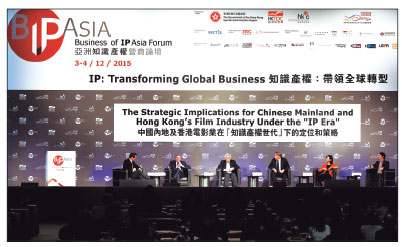Better film IP protection, more diversified revenue
Updated: 2015-12-04 08:14
By Oswald Chan(HK Edition)
|
|||||||||
Asia Leadership Roundtable panelists speak of strategic implications for the mainland and HK movie industries in IP era. Oswald Chan reports.
The mainland movie industry should gear up for an intellectual property (IP) protection drive so that it can reap the benefits of a diversified revenue stream when movie content crosses over to different new media, the Asia Leadership Roundtable heard on Thursday.
The panelists also expressed confidence that Hong Kong can act as a bridge between the mainland movie industry and Hollywood. In the future, there would be opportunities for the Hong Kong movie industry to bring mainland movies into the world market, they said.
The roundtable forum, themed "The Strategic Implications for Chinese Mainland and Hong Kong's Film Industry under the IP Era", was part of the fifth BIP Asia forum taking place on Thursday and Friday.

Panelists representing the US and Hong Kong film industries, film finance companies and legal firms were invited to examine the likely business potential once the mainland movie industry beefed up its efforts in IP protection.
"Being a gateway to the Chinese mainland and by extension to the Asia-Pacific region, Hong Kong is in a unique position facilitating the traffic of IP-sharing exchange between the East and the West," said Zhou Li, publisher and editor-in-chief at China Daily Asia Pacific. "In terms of collaboration between Belt and Road countries (and regions) in moviemaking, there are big opportunities ranging from production to marketing. Certain movie companies on the Chinese mainland would make use of overseas companies' powerful marketing tools."
"The Chinese mainland is poised to overtake the US as the world's largest film market by 2017 and this market has registered 20 times revenue growth from 2004 to 2014. The Chinese mainland's film market is too big to ignore," said Michael C. Ellis, president and managing director for Asia Pacific region at Motion Picture Association.
However, while 89 percent of mainland movie companies' revenues come from box-office takings, this is not the case in Hollywood, as US filmmakers can generate income from different sources including franchising and licensing, Ellis noted.
"IP as a valuable asset for film companies has not been exploited on the mainland. As making movies on the mainland is getting more expensive, they should consider whether it is enough just to have the box-office revenue," Ellis pointed out. In a rapidly changing economy, the movie industry is increasingly becoming a commercial product. Hence a standardized and transparent procedure is required to ensure the money invested is well spent. Therefore mainland movie companies are also well-advised to maximize returns from investment.
"Movie companies should think long-term how IP protection can provide income in the future,' said Jason Goldberg, a partner at law firm Covington & Burling LLP and leader of the firm's entertainment, sports and media practice in China. "The awareness of IP protection in the mainland movie industry is there, but the structure and expertise to implement that awareness is something that still needs to be developed."
"Nowadays when we are making films, we will invite those IP-related professionals to get involved in the story-designing process. These professionals may come from the industries of music, toy making, merchandising and advertising. We are looking at the IP aspect of the movies," said Percy Fung Tze-cheong, production director of Digital Magic Ltd.
The panelists at the roundtable also voiced confidence that Hong Kong can be a bridge to link the mainland movie industry and Hollywood.
"In the future, there will be opportunities for the Hong Kong movie industry to work closely with the mainland movie industry to bring Chinese movies to the world. I really believe, in the next five years, there will also be opportunities for big Chinese IP to go out to the world," said April Ye, chief executive officer at Film Finances Inc China.
"There is a bright future for IP flowing into the mainland as well as going out from the mainland," Dragongate Entertainment Ltd Chief Executive Officer William Pfeiffer said.
"Mainland investors are looking for investment in the Hollywood film-making industry. At the same time, US movie companies are also looking for long-term partnerships to make Chinese films. Some filmmakers have greater budget and they want to get more Chinese culture relevance in their movies," Pfeiffer added.
"There are definitively opportunities for the mainland to build up its own movies. As mainland people want to see films played by locals and in their own language, the mainland audiences would like to see more Chinese films. The chance is there to build up great Chinese films in the next five years," Ye from Film Finances Inc said.
Contact the writer at oswald@chinadailyhk.com
|
Zhou Li, (center) publisher and editor-in-chief of China Daily Asia Pacific; with (from right) Jason Goldberg, partner of Covington & Burling LLP; April Ye, CEO of Film Finances Inc China; William Pfeiffer, chief executive officer of Dragongate Entertainment Ltd; Michael C. Ellis, president and managing director for Asia-Pacific region at Motion Picture Association; Percy Fung Tze-cheong, production director at Digital Magic Ltd; and Alexander Wan, moderator, pose for the cameras at the China Daily Asia Leadership Roundtable forum at the Hong Kong Convention and Exhibition Centre on Thursday. Photos by parker Zheng / China Daily |
|
Speakers held up Hong Kong as a bridge between the mainland and Hollywood. |
(HK Edition 12/04/2015 page11)

